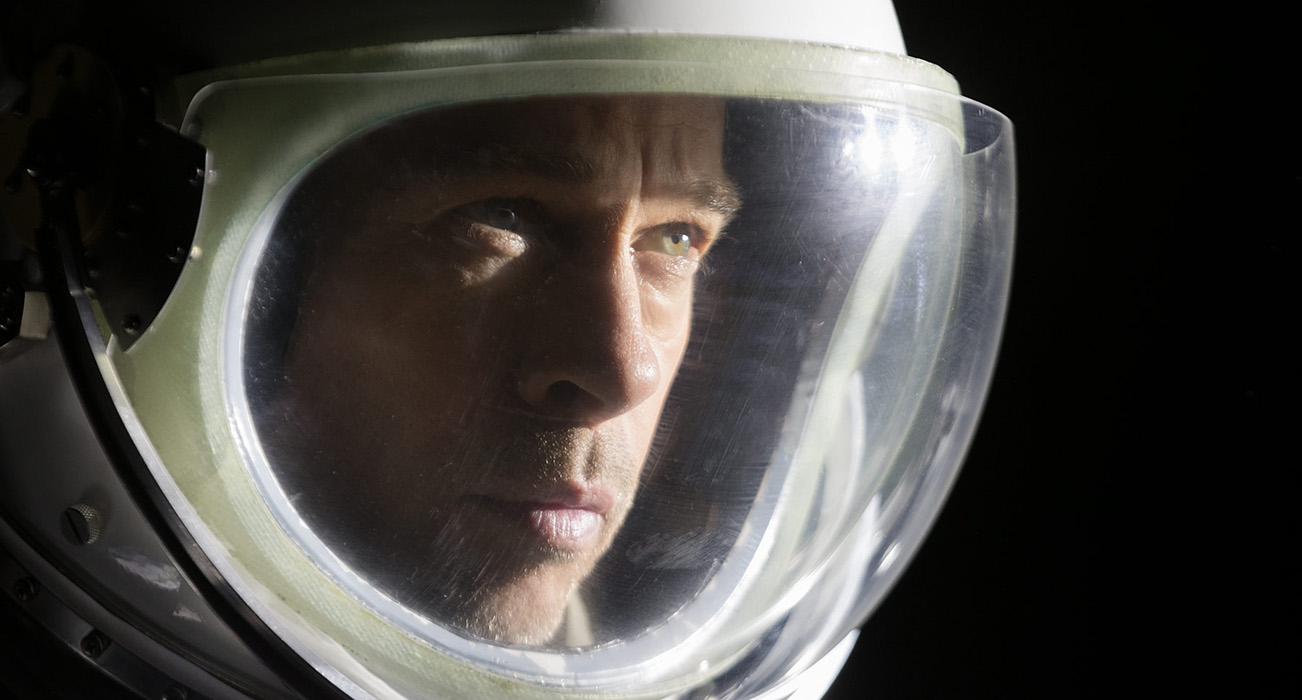In the opening scene of Ad Astra, Roy McBride (Brad Pitt) exits the International Space Antenna for some routine maintenance. A power surge storms through the space antenna and Roy falls. With an acclaimed calm that lures the viewer into thinking the scene a dream, Roy falls thousands of feet before releasing his parachute and slamming into the ground. The entirety of James Gray’s new blockbuster exists within the last utterance of a desperate man: Roy, resigned to his fate predetermined by his father, calmly cries out to be saved, in danger of floating into abject obscurity.
When Roy was 16, his father, Clifford McBride (Tommy Lee Jones), left his family to captain the furthest attempted space voyage. Clifford’s project would take him and his crew all the way to Neptune in search of extraterrestrial life. Roy, understanding his dad’s motivation, enlists in the U.S. Space Command and becomes a decorated Major. After his plummet to earth from the space antenna, SpaceCom informs Roy they believe that his father, long-presumed dead, is now thought to be alive and responsible for the power surges. They task him with traveling to Mars to communicate with Clifford to verify whether or not he is alive.
The majority of Ad Astra takes place inside Roy’s head, giving only a limited experience of the narrative — a feature that’s likely to bug quite a few moviegoers. It’s precisely within his head, though, that the most interesting action occurs. Through his voiceover, Pitt depicts a man wrestling with his identity. He takes great pride in his ability to remain calm and always pass his psychological evaluations.
Within this framework, Pitt exercises expert control over his body and face as the reserved Roy. This level of control is something relatively new to Pitt in this latest phase of his career; he’s traditionally been an actor that, even at his best, has leaned on physical ticks to make his character appear more interesting and thoughtful. Yet in this widely-lauded performance and his other from this year, Once Upon A Time In Hollywood, he exhibits a rigorous understanding of both his substantial star power and the facial decisions he makes.
James Gray also steps a little outside his comfort zone in directing Ad Astra. A career that includes intimate, family-crime dramas and tragedy-ridden treasure hunts, hits its stride with the director’s most expensive film to date. With a budget exceeding $100 million it’s a certified blockbuster. But it’s quite unlike any blockbuster audiences have seen lately. The cerebral thriller often embraces the follies of a large-budget epic by including zero-gravity knife fights, moon pirates, and a galactic Applebee’s; but from Roy’s suffocating viewpoint, all the whimsy that can be found in action films is brought level with a calm and realistic tone.
With its initial festival release, the buzz surrounding Ad Astra was that it was a male weepy. That may be, especially given the subject matter of needing to reckon with the weight of Roy’s father’s sins, but it struck me as a bit colder. Instead of the cathartic power of that type of film, Ad Astra digs deep below the surface and continued to bother me for days following. It begs the question: How far is someone willing to go to hide their pain? Burrowing to the edge of the Milky Way is not seen as heroic, but instead cowardly.
Within the “work hard, play later” mindset instilled by his father, Roy is conditioned to recede into himself and completely relinquishes his freedom for a glimpse of the promised success. By the end of the film, Gray’s main question seems to be: As we recede farther and farther beneath our skin in search of an acceptable success, do we lose what makes us human in the first place? As definitive as his answer is, how he arrives at that answer is certainly not.






